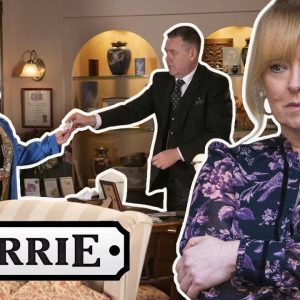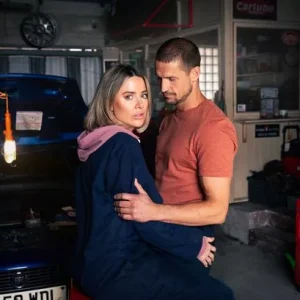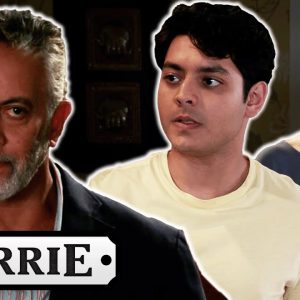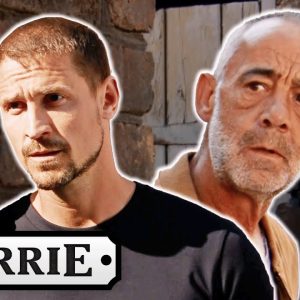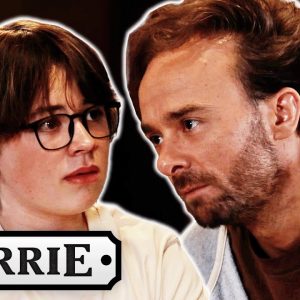What was supposed to be a lighthearted afternoon filled with sausages, laughter, and camaraderie has quickly spiraled into an emotional battleground in Coronation Street, where buried resentments, social exile, and judgmental whispers threaten to boil over under the summer sun.
In typical Weatherfield fashion, what begins as casual banter over barbecue logistics between friends quickly unveils layers of emotional weight, unresolved grief, and the harsh consequences of one family’s scandal still haunting those left behind.
David, ever the comic relief, is puffing up his chest as the king of the grill—meat-laden and caveman-inspired. His boastful grocery escapade may draw laughs, but beneath the surface, the upcoming gathering is more than just a party—it’s a powder keg of conflicting alliances and uncomfortable truths.
Meanwhile, a familiar tension lingers in the air between Gary and his skeptical neighbor, revealing a far more serious undercurrent. As a GCSE chemistry book is tossed aside, what should be teenage angst morphs into a confrontation laced with judgment, defensiveness, and a chilling reminder of how tightly the residents of Coronation Street cling to past sins. When someone lashes out with “Me and my family are decent people,” it’s not just a declaration—it’s a pointed defense against the shadow of being socially ostracized.

And that shadow is most heavily cast on one woman in particular.
Trying to fit in. Trying to move on. Trying to survive the storm that her husband created. But for the newest outsider in Weatherfield, every small step toward redemption is met with two steps back. The desperation in her voice—“I just feel like I’m trying so hard to fit in around here and no one wants to know me”—carries the weight of a woman on the brink of emotional collapse. The street might be smiling, hosting barbecues and sipping beers, but the scars of betrayal haven’t healed. Especially not for Maria.
Her harsh rejection at Craig’s is more than a public humiliation—it’s a public reckoning. No apology, no gesture, no humble visit can undo the damage caused by her husband’s past. And now, in the unforgiving court of public opinion, she’s the one paying the price.
It’s Audrey who gives her a sliver of compassion—blunt but sincere. Audrey, ever observant and wise, reminds her that passions are still running high. It’s true. People on this street don’t forget, and they don’t forgive easily. While her words offer some balm, they also carry a warning: this isn’t over. And if the tide doesn’t turn soon, there may be no future left for this shattered family in Weatherfield.
Behind every small scene lies emotional carnage. As neighbors chat about meat and party times, there are kids aching for their father, a woman wondering if she has any chance of a fresh start, and an entire community walking on eggshells.
Then comes the quietest twist of all—farewell drinks.
While others prepare for smoky sausages and garden laughter, she makes a subtle but heart-wrenching pivot. She won’t be going to the barbecue. She’s chosen farewell drinks with old neighbors from Grass. A small detail? Not quite. It’s a silent admission that she may never truly belong here. Her soul is weary, her smile forced, and her absence from the social gathering is louder than any confrontation.
This farewell signals more than drinks. It signals retreat. A woman emotionally battered by whispers and rejection is reaching her limit. She’s already considering uprooting her children—again. The wounds are deep, and the judgment relentless. And now, even a change of hairstyle is met with comic disapproval from Glenda and Audrey, a light moment in contrast to the emotional gravity swirling beneath.
Still, even as she contemplates her next move, another emotional thread weaves through the day—responsibility. Audrey, in her charming but commanding tone, reminds everyone of David’s forgotten errand. It’s yet another sign of the disarray—how small tasks, once routine, now feel overwhelming. And though others offer to help, there’s an unspoken weight in every rejection and every offer declined. Everyone’s carrying something.
As we head toward the BBQ—an event meant to unite but poised to ignite—tensions are simmering. Will long-held grudges finally erupt? Will lines be drawn that can’t be uncrossed?
There’s an eerie sense that the street’s festive mood is built on fragile foundations. While some prepare burgers, others are preparing escape plans. And as the sausage sizzles, the secrets burn even hotter.
What Coronation Street continues to do so masterfully is thread personal trauma into community conflict. No character is an island. Every harsh word, every cold shoulder, every decision not to attend a simple social event echoes across families, friendships, and fragile attempts at redemption.
This latest episode isn’t just about meat and bangs and errands—it’s about identity, forgiveness, and the painful realization that some people, no matter how hard they try, may never be allowed to start again.
As the smoke from David’s barbecue curls into the sky, so too do questions that haunt the cobbles:
Can a woman be forgiven for her husband’s sins?
Will children continue to suffer the sins of their father?
And when your neighbors become your enemies, where do you go next?
In Coronation Street, even a sunny afternoon can leave you chilled to the bone.
